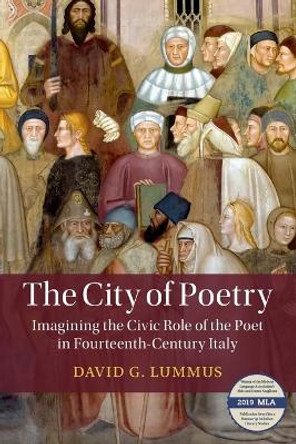Description
About the Author
Alexander Lee is a fellow in the Centre for the Study of the Renaissance at the University of Warwick. Educated at the universities of Cambridge and Edinburgh, he has previously held positions at the University of Oxford, the Universite du Luxembourg, and the Universita degli studi di Bergamo. His recent publications include Petrarch and St. Augustine: Classical Scholarship, Christian Theology, and the Origins of the Renaissance in Italy (2012) and The Ugly Renaissance (2013). He is currently completing a biography of Niccolo Machiavelli.
Reviews
Humanism and Empire extinguishes permanently the myth of an intrinsic link between early Renaissance humanism and Italian civic republicanism that pervades scholarship today. Combining meticulous readings of key political texts from late thirteenth- and fourteenth-century Italy with a wealth of historical background about the era's cross-cutting systems of power, Alexander Lee demonstrates both how and why the ideal of universal empire retained such attraction at a time when the actual authority of the Roman Emperor was in steep decline. This book transforms forever the approach scholars must take to the study of late medieval and early modern political thought in Italy as well as throughout the rest of Europe. * Cary J. Nederman, Texas A&M University *
Alexander Lee has authored a fascinating intervention into a historiography that one might have thought somewhat settled, that of "Civic humanism" and of Italian late medieval and Renaissance political thinking in general. Focusing intently as he has on the fourteenth century - on its complicated political and military history, the writings of its humanistic thinkers, and its civic culture - Lee has given us a new view of the background of more familiar thinkers, like Coluccio Salutati and Leonardo Bruni. Lee's book is grounded, in a welcome fashion, in contemporary sources. This foundation yields a quite revealing look at fourteenth-century mentalities and a decided leaning (hitherto unappreciated) on the part of many thinkers, toward the Holy Roman Empire as a potentially stabilizing force in then tumultuous Italian politics. It is a quite brilliant book, sure to engender admiration and debate for years to come. * Christopher S. Celenza, Georgetown University *
[A] dazzling display of learning and ambition * Hester Schadee, University of Exeter, Speculum *
Humanism and Empire is an impressive feat of erudition and may well become a landmark for historians of medieval political thought. * Antonio Ferraz de Oliveira, University of Cambridge, Journal of Historical Geography *
This is a book that all scholars of learned culture and politics in late medieval and...early modern Europe will need to read. * Brian Maxson, East Tennessee State University, English Historical Review *
[A] much-needed major contribution to the scholarship of Italian politics. * Carrie Benes, New College of Florida, American Historical Review *
This volume...springs from an interest in the history of culture and has the particularly original and significant goal of addressing, in all its complexity, the imperial ideal in the fourteenth century... The range of documents which Lee takes into account is rich...The book...straddles two different historiographical and methodological fields, namely political history, on the one hand, and, on the other, the study of literary and historical works from late medieval Latin culture. The interaction is extremely stimulating... Lee's work proceeds effectively, and relies above all on a subtle analysis of the reading of imperial history in the humanists' works. * Lorenzo Tanzini, Universita degli study di Cagliari, Archivio Storico Italiano *
The book's impressive range of evidence...evinces Lee's encyclopaedic knowledge of his subject matter and the comprehensive archival research that went into...the establishment of a new historiography of Italian humanism...The redefining nature of Lee's argument places the author among the great historiographers... * Goran Stanivukovic, Saint Mary's University, Renaissance and Reformation *
Lee offers a new interpretation of humanist political thought that contributes to the reappraisal of the foundations of early modern constitutional ideas... Lee's analysis is broad, original, and careful. * George Steiris, National and Kapodistrian University of Athens, Conatus *
In this book, Alexander Lee...has shown just how much the Holy Roman Emperor's physical absence from Italy remained pressingly present within the political culture of early Renaissance humanism. Overthrowing existing scholarship that has seen humanists' attraction to the office of emperor and the power of imperium as a minor aside from the movement's supposed fascination with communal liberty and Ciceronian republicanism, Lee demonstrates the vitality of the imperial ideal... * Michael Paul Martoccio, University of Colorado, History *
[Lee] refutes the thesis, first developed in the nineteenth century with the first studies of humanism by scholars of the calibre of Jacob Burckhardt and followed in the twentieth by Hans Baron, Quentin Skinner and others...according to which there was an almost Manichaean dualism which seemed to clearly separate 'medieval' and 'humanistic', the first a blind adherence to imperial and absolute forms of government, while the second the champion of communal and republican liberty against the 'tyranny' of emperors and signori...The book has the great merit of tracing such a broad and complex discourse argument from the point of view of historical events and on the basis of contemporary sources, abandoning the essentially intellectual approach which has characterised much of the historical writing on the subject. * Gabriele Bonomelli, University of Bologna, Storicamente *
[A]n interesting study, which should stimulate closer examination... * Romedio Schmitz-Esser, University of Graz, Historische Zeitschrift *
Book Information
ISBN 9780199675159
Author Alexander Lee
Format Hardback
Page Count 462
Imprint Oxford University Press
Publisher Oxford University Press
Weight(grams) 1g
Dimensions(mm) 242mm * 163mm * 33mm










